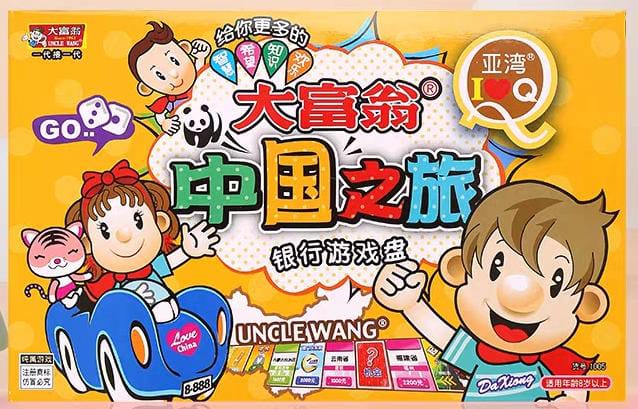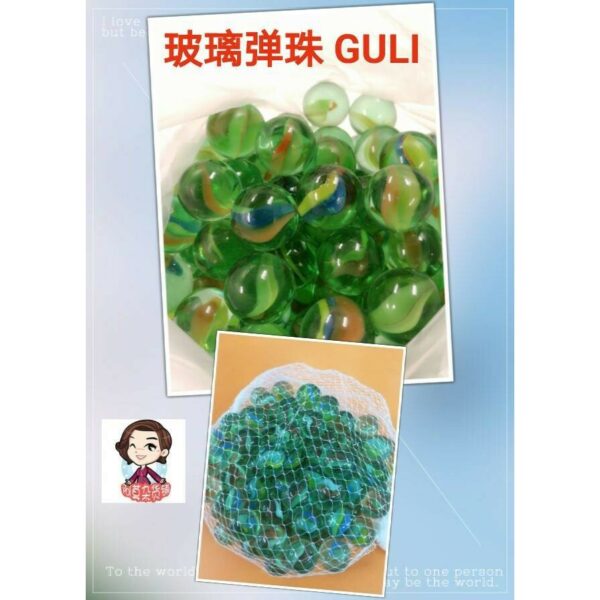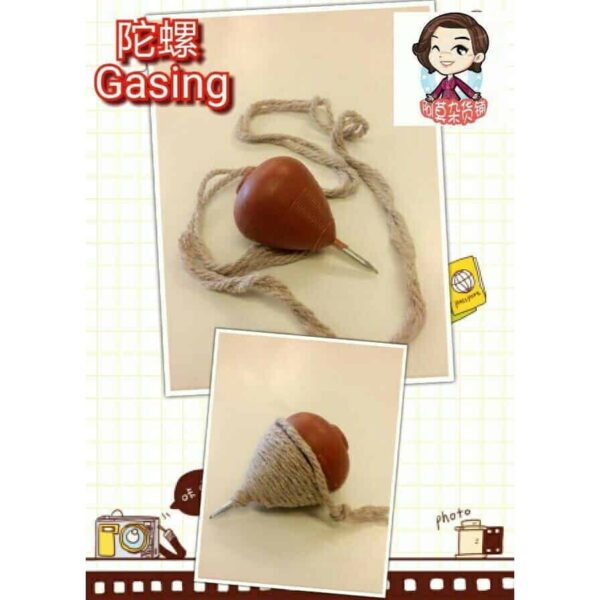Product Description
中文版:游戏介绍与详细玩法
一、游戏简介
“Uncle Wang 大富翁 中国之旅 银行游戏盘 Q版”是一款以中国各地城市/地标为主题的银行机制桌游。玩家在游戏中“游历中国”,购置地产、收取租金、建造发展、与其他玩家交易,目标是积累最多财富或成为最后一位未破产的玩家。该版本为“Q版”画风,更加轻松、卡通,适合家庭和儿童游玩。
二、组件(典型)
-
棋盘:格子展示中国各地知名城市或景点。
-
玩家棋子:每人选一个代表。
-
起始现金:每位玩家从“银行”领取统一金额。
-
地产卡/产权卡:对应可购买格子。
-
建筑物标志(如房屋、旅馆或升级标志)—视版本规则是否包含。
-
事件卡/机会卡:当玩家落在特定格子时抽取执行。
-
掷骰子或转盘:决定玩家移动步数。
-
一个玩家担任“银行家”:负责管理现金、地产、拍卖。
-
说明书:包含具体规则与资产核算方式。
三、游戏目标
玩家通过购置地产、发展、收取租金、交易并避免破产,使自己的资产(现金 + 地产 + 建筑)最大化。游戏结束时,若只剩下一名玩家未破产,则该玩家胜出;或若达成预设的胜利条件(如资产目标)则资产最多者胜。
四、游戏准备
-
将棋盘、现金、地产卡、事件卡、建筑物、棋子等组件准备好。
-
每位玩家领取相同起始现金(具体金额按说明书)。
-
地产卡与对应棋盘格子匹配,并放入银行区备用。
-
指定一名玩家为“银行家”,负责发放现金、管理地产卡、主持拍卖。
-
每位玩家选择棋子,并将其放在“起点”格(通常标记为“出发/Go”)。
五、游戏流程
-
按顺时针顺序轮流进行。
-
当前玩家掷骰子(或使用转盘)决定移动步数。
-
若掷出双数(若规则允许)可能获得额外行动。
-
-
玩家将棋子移动相应格数,落在某格后执行以下操作:
-
若落在 未被购买 的地产格:玩家可选择购买该地产并支付给银行。若放弃购买,则进入银行家主持拍卖,其他玩家可竞价购买。
-
若落在 他人拥有的地产:玩家需支付租金给该地产拥有者。租金数额根据地产等级、是否有建筑、是否拥有整组等条件而定。
-
若落在 事件卡/机会卡格:抽取卡牌并按卡牌说明执行(可能获得现金、被罚款、前进或后退、停一回合等)。
-
-
若玩家拥有某一颜色组或版图上定义的一组全部地产,并且规则允许,可在其地产上建造建筑物(如房屋、旅馆)或升级标志,以提高该地段未来租金。
-
玩家之间可进行 交易:包括地产交换、现金补差、卡牌或建筑物交换等。
-
若玩家现金不足以支付租金或罚款,可选择将自己的地产抵押给银行、卖出建筑物、与其他玩家协商筹资。若仍未能偿付,则该玩家宣告破产、退出游戏,其资产可能被拍卖或由银行处理。
-
回合结束后,轮到下一位玩家。若玩家手中资产或持卡数超过版规限制(若有此限制),应按规则调整。
-
胜利条件:当只剩一名玩家未破产,或达成预设资产目标/回合数时,游戏结束;胜利者为资产最多者或最后存活玩家。
六、Q版特点与备注
-
“Q版”提示此版本画风较为卡通、简化,适合亲子或儿童娱乐。
-
银行游戏盘机制突出“银行家”角色、拍卖流程、资金流动,在提高游戏互动与竞争性。
-
中国之旅主题使地产名称、格子内容本土化,利于玩家了解中国地理/城市。
-
建议玩家人数通常为 2‑6人,适合年龄约 6岁以上,游戏时长视版型而定,可能为 约20‑40分钟。
-
若说明书中使用转盘替代骰子,说明移动机制略有变化。
-
玩家可视需要自行设定胜利资产目标,以缩短或延长游戏时长。
🇬🇧 English Version: Game Introduction & Detailed Rules (China Tour Bank Game Board Q‑Edition)
1. Game Overview
The “Uncle Wang Monopoly – China Tour Bank Game Board Q‑Edition” is a themed board game where players travel around Chinese cities and landmarks to buy properties, collect rent, develop buildings, trade assets, and aim to become the wealthiest or the last surviving player. The “Q‑Edition” indicates a cute, simplified design ideal for families and children.
2. Components (Typical)
-
Game board: squares depicting various Chinese cities or famous locations.
-
Player tokens: each player chooses a token.
-
Starting cash: equal amount given to each player by the bank.
-
Property Title Deed cards: correspond to purchaseable squares on the board.
-
Building tokens (houses/hotels) or upgrade markers, if building mechanism included.
-
Chance/Event cards: drawn when landing on special squares.
-
Dice or spinner: used to determine movement steps.
-
Banker role: one player acts as banker to manage money, property transactions, auctions.
-
Rulebook and player tokens.
3. Objective
By acquiring properties, developing them, collecting rent, making trades and avoiding bankruptcy, players aim to maximize their assets (cash + properties + buildings). The winner is the richest at end of the game, or the last remaining solvent player.
4. Setup
-
Prepare all money, property cards, event cards, building pieces and player tokens.
-
Each player receives equal starting cash from the bank.
-
Shuffle event cards and place in designated area.
-
Choose one player as Banker: manages money, property deeds, auctions and transactions.
-
Place all player tokens on the “Start” square.
5. Gameplay
Players take turns in clockwise order. On a player’s turn:
-
Roll dice / spin spinner to determine how many squares to move.
-
If rolling doubles (if version allows), the player may get an extra turn.
-
-
Move your token accordingly.
-
Landing action:
-
If landing on an unowned property: you may buy it from the bank; if you decline, the bank auctions it among players.
-
If landing on a property owned by another player: you pay rent to that player; rent may be higher if buildings exist.
-
If landing on a Chance/Event square: draw the card and execute its instructions (gain cash, pay fine, move to another square, skip turn etc).
-
-
If you own all properties of a colour set (or defined group for this edition), you may build houses/hotels (if rules allow) to increase rent.
-
Players may trade properties and cash among themselves at any time (or as permitted by rules).
-
If you cannot pay rent or fines, you may mortgage properties, sell buildings or negotiate a deal with other players. If you still cannot pay, you are bankrupt and eliminated; your assets are handled according to game rules.
-
End your turn; if you hold more assets/cards than permitted (if there is a limit), adjust accordingly.
-
Winning: The game ends when only one player remains solvent or a preset victory condition is met; the richest or last‑standing player wins.
6. Q‑Edition Specific Notes
-
The Q‑Edition features simplified gameplay, family‑friendly visuals and possibly fewer property sets or simplified building rules.
-
The Bank Game Board format emphasizes centralized banking, auctions, and financial decisions.
-
The China Tour theme uses Chinese cities/landmarks for properties, giving local flavour.
-
Typical players: 2–6; typical age: ~6+; estimated play time: ~20‑40 minutes depending on version.
-
Check the box for variant features: e.g., spinner instead of dice, simplified building mechanism, themed event cards.







Reviews
There are no reviews yet.